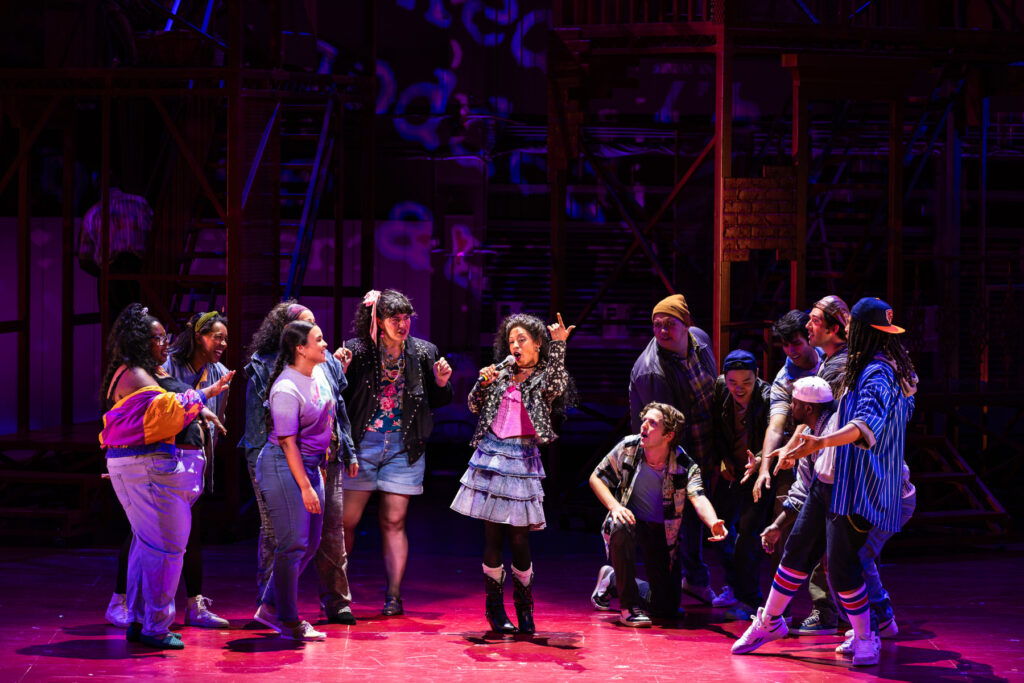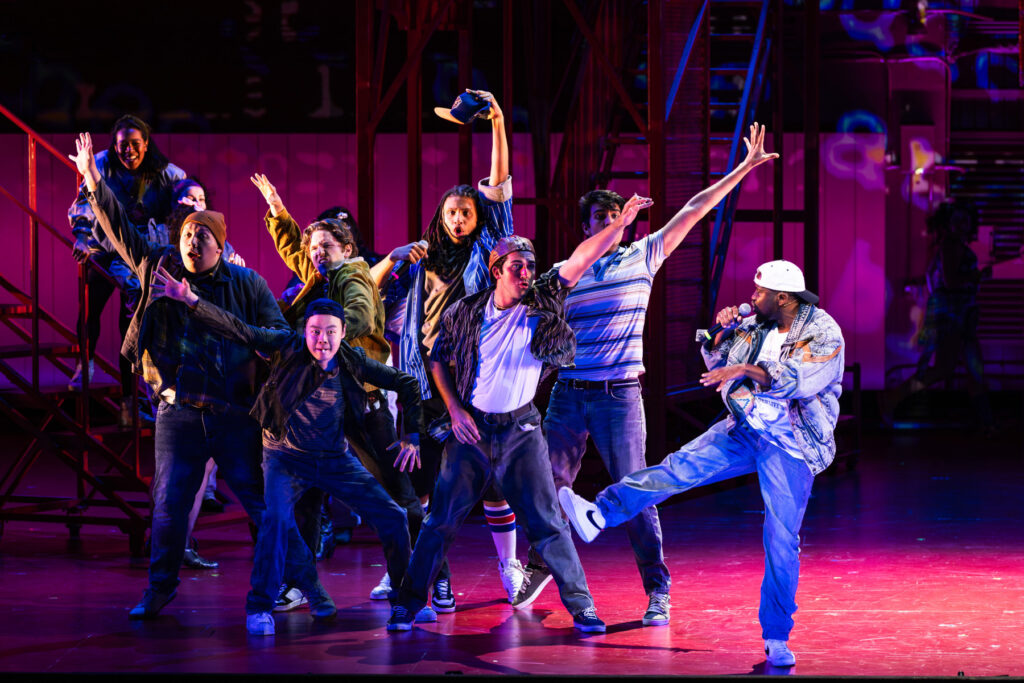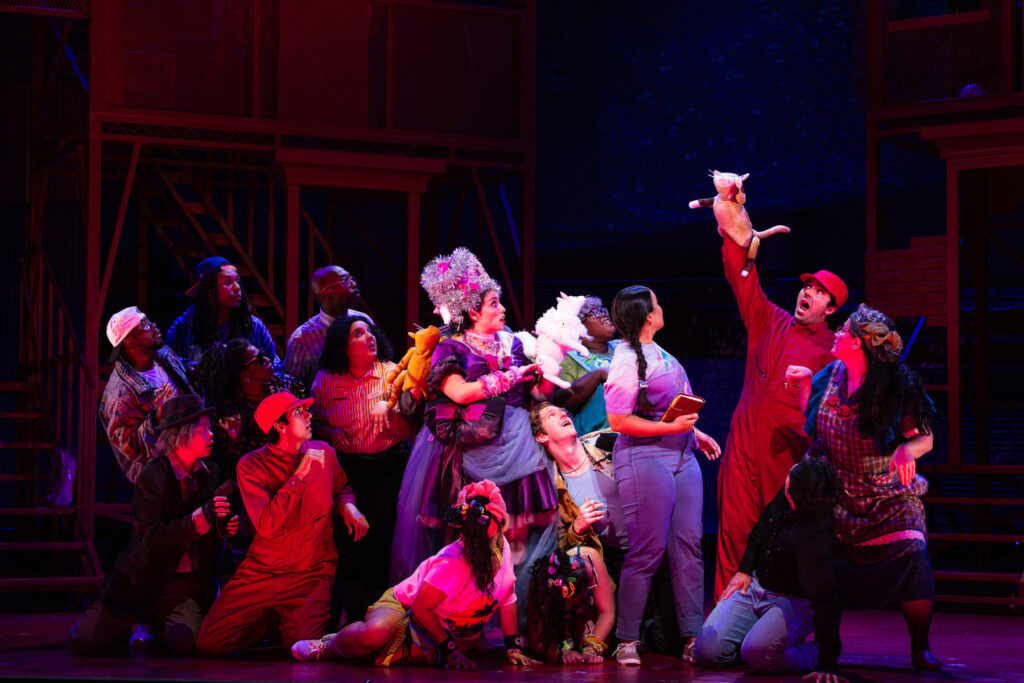For its landmark Fiftieth Anniversary Season, the Glimmerglass Festival is to be heartily commended for commissioning a bold new work, The House on Mango Street, by composer Derek Bermel, who also co-wrote the libretto with Sandra Cisneros.
The piece is adapted from Ms. Cisneros’ novel of the same name. It is not a through narrative but rather is a collection of vignettes, hinting at the story of Esperanza Cordero, a 12-year old Chicana coming of age in Chicago’s Hispanic community. The novel chronicles one year in Esperanza’s life as she endures facing the harshness of living as a poor young woman in a patriarchal society. She longs to break free from this structural paralysis and turns to documenting and exorcising her experiences by writing about them. Based on Cisneros’ own life, this book is considered a modern classic of Chicano literature.
Because the book contains so many elements of Mexican-American culture, composer Bermel has boldly set out to incorporate no fewer than thirteen different Hispanic musical styles into the piece, with varying degrees of success. This ambitious attempt has left out one quite important element in creating a new opera: Opera. There were few chances for well trained, talented classical singers to soar, and when they did their duration was notably brief. There is nothing wrong with creating a musical theatre piece of disparate styles, but they need to be better related aurally and not be jarring shifts from rap to gospel to Tejano to Broadway. This is more akin to Lin-Manuel Miranda than to say, Cruzar la cara de la luna.

That is not to say there are not some very appealing set pieces, and musical effects. There are, and Mr. Bermel is clearly a genuinely talented and imaginative creator, but too much of the time it seemed Esperanza’s journey was marching in place. That is largely owing to a libretto and score that give way too much stage time to secondary, tertiary, and even walk-on characters, while Esperanza’s arc can’t gain a head of steam. It is almost as though things were happening around her and to her, without happening enough at all “with” her.
The production values, exceedingly high all Festival long, were once again excellent. The late Set Designer John Conklin has shown a superior level of artistry. His gifts will be sorely missed, but his setting on this occasion was beautifully realized by his Associate, James Rotondo. It is by turns stylized realism and boldly fantastical. The two, two-story frame houses were imposing and very effective at conjuring up a scrappy residential neighborhood. The colorful, folk inspired images that were occasionally flown in were hallucinogenic in their vivid ritualistic impression. The foreboding circus pieces were eye catching yet menacing. The flow of the set pieces throughout the performance was well choreographed and cleanly executed by cast and (especially) the well-oiled machine that was the stage crew.
Lighting Designer Amith Chandrashaker has filled the stage with nuance and moody subtleties, that were warm and hospitable one minute, and coolly dangerous the next. His well-paced alternation of area effects and solo spots added greatly to the visual pace and appeal. The ubiquitous Projection Designer Greg Emetaz reliably created yet another well-considered progression of still and moving images that elevated the story telling to the highest level. Mr. Emetaz enriches so many productions, everywhere in the industry that I swear there must be two of him. Erik Teague’s costumes are perfectly reflective of the everyday characters and do much to inform us of their place in the social pecking order. When the show moves into the realm of a surreal, voodoo religious ceremony, Mr. Teague has obliged with wildly imaginative and evocative attire.

Director Chía Patiño, abetted by Choreographer Amanda Castro has given us much to enjoy in her varied and well-focused staging. Ms. Patiño has used every opportunity available in the various levels of the house and stairway structures to create varied and evolving stage pictures. Her blocking is clean and economical, and she does her best to try to focus the story around Esperanza. She does manage to bring out the most she can from each performer, no matter how small the role. And Ms. Castro has devised some infectious dance steps that contribute a lot to the lighter moments.
In the pit, Conductor Nicole Paiement worked tirelessly to bring authenticity to each musical style, and she effectively commanded the exceptional group of musicians with easy authority. Maestra Paiement was also highly effective in corralling the large group of singers to respond with well-rehearsed precision. The exemplary choral work was prepared by Chorus Director Katherine Kozak. If the orchestra occasionally threated to outbalance the singers here and there it is likely the cause of heavy orchestration and not Ms. Paiement.
The leading role of Esperanza was well-taken by Mikaela Bennett. Although she has a number of classical appearances on her resume, this appealing soprano was on this occasion giving a performance more in a well-modulated musical theatre style. Unlike anyone else in the cast, Ms. Bennett had a body mike, and the amplification was slightly cloudy, somewhat blunting the genuine sweetness and appeal of her limpid soprano. The fact that she was amplified also coaxed her into occasionally singing with more intimacy than was advisable. Still, she was very affecting in the very good final song, “A House of My Own.”

A powerhouse singer that needed no help being heard was the esteemed mezzo, Deborah Nansteel. As Mama Cordero, she poured out rich, arching tones and phrases that were meltingly crafted. And now I come to my very favorite highpoint of this production, and that was the chance to showcase many of the incredible apprentices in the Resident Artists Program. Every other role in the show was taken by members of this training program, and since I had also enjoyed hearing them in an Industry Audition, I hope you will indulge me in sharing impressions from this performance that at times are mashed up with those from the tryouts.
Samantha Sosa (Lucy) is possessed of a full, warm lyric soprano. Kaylan Hernandez (Rachel) is another assured soprano with a glistening sound. Taylor-Alexis DuPont (Sally) not only does a mean rap, but her mezzo also went on flights of lovely, mellifluous arching phrases. Angelo Silva (Geraldo) was a standout for his mellow, freely produced tenor. Soprano Sarah Rosales (Alicia)
had the chance to deploy her potent chest voice but also showcased a most pleasing top register. Tshilidzi Ndou (Sire) was a master of declamation, and his baritone has a pleasant, distinctive timbre. Alicia Russell Tagert (Rafaela) sports a beautifully trained soprano with a pleasing touch of metal. Catharine (Cathy/Tree) Thornsley’s sterling soprano was notable for her meltingly lovely vocalizing. (But wait, there’s more.)
Natalie Corrigan (Ruthie/Shamana 1) enjoys a secure, plush tone in her polished mezzo. Tzytle Steinman (Edna/Mail Lady/Tree) although playing a strident harridan, has a mezzo characterized by an opulent, pulsing sound. Mezzo Sedona Libero (Shamana 2) shows off a responsive tonal quality and evenly welded registers. Kendra Faith Beasley (Shamana 3) displayed a dark hued tone that characterizes her unique mezzo. Jabari Lewis (Tito) is a charmer with appealing panache and brightness in his polished tenor. Edward Ferran (Squinky) may have not been a sympathetic character, but his attractive tenor demonstrated a warm pliable sound. Reed Knepper (Guy/Cop) had precious little to sing here, but trust me, his characterful tenor abounds in alluring sound and charismatic presence. (We’re almost there.)
Edmond Rodriguez (Tree) regaled us with a vibrant baritenor. Sergio Martinez (Papa Cordero) has a gorgeous, imposing bass, generous in its rolling amplitude. Shyheim Selvan Hinnant (Preacher Man) may be impersonating a bad man but can almost be forgiven for having such a ringing, solid bass-baritone. William Raskin (Casanova/Calaca) was yet another terrific bass, his instrument flexible and engaging. Finally, Zizhao Wang (Munch/Bum Man/Tree) successfully combined a sympathetic stage presence with his orotund, mellow bass-baritone to create a memorable effect.
And that, my friends, was the true glory of The House on Mango Street, these supremely talented young artists, who are getting the chance of a lifetime to create these roles for the very first time. Thank you, Glimmerglass, for giving them that experience.
Assuredly , there is an abundance of talent on the creative side of the team as well. The good stuff is so good, that I hope that the creators might consider trimming it to a long one act, minimize the side tracking with minor characters, and truly focus on Esperanza’s journey. As it is, The House on Mango Street still seems under construction.
James Sohre
The House on Mango Street
Music by Derek Bermel
Libretto by Sandra Cisneros and Derek Bermel
Esperanza: Mikaela Bennett; Lucy: Samantha Sosa; Rachel: Kaylan Hernandez; Sally: Taylor-Alexis DuPont; Geraldo: Angelo Silva; Alicia: Sarah Rosales; Sire: Tshilidzi Ndou; Rafaela: Alicia Russell Tagert; Cathy/Tree: Catharine Thornsley; Mama Cordero: Deborah Nansteel; Ruthie/Shamana 1: Natalie Corrigan; Edna/Mail Lady/Tree: Tzytle Steinman; Shamana 2: Sedona Libero; Shamana 3: Kendra Faith Beasley; Tito: Jabari Lewis; Squinky: Edwartd Ferran; Guy/Cop: Reed Gnepper; Tree: Edmond Rodriguez; Papa Cordero: Sergio Martinez; Preacher Man: Shyheim Selvan Hinnant; Casanova/Calaca: William Raskin; Munch/Bum Man/Tree: Zizhao Wang; Conductor: Nicole Paiement; Director: Chía Patiño; Set Designer: John Conklin; Associate Set Designer: James Rotondo; Costume Designer: Erik Teague; Lighting Designer: Amith Chandrashaker; Choreographer: Amanda Castro; Projections Designer: Greg Emetaz; Hair and Make-up: Tom Watson; Chorus Director: Katherine Kozak
Top image: Sergio Martinez (center) as Papa Cordero, Mikaela Bennett as Esperanza, and Reed Gnepper as Guy in the world premiere production of The House on Mango Street. Photo Credit: Brent DeLanoy/The Glimmerglass Festival